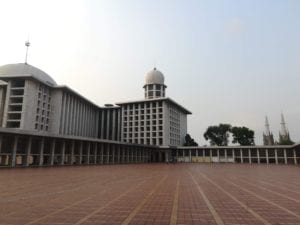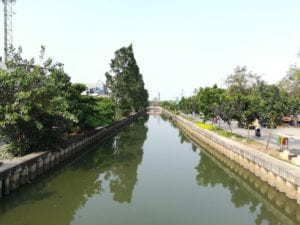JAKARTA
Anmei
Jakarta has seen so many nations and their cultures come and go (or stay). Once a bustling trading hub between the East and the West, it has received influences from the Dutch, Portuguese, Arabic, Indian, Chinese, and Japanese through exploration, colonization, or conquest. Jakarta is proof that it’s extremely difficult, if not impossible, to explain a group’s culture as one solid, defined entity. As I learned more about Jakarta through visiting cultural sites and speaking with locals, it dawned on me that non-native born people can make a huge impact on a place: the foreigners, the expats, the colonizers, the immigrants, the tourists, the explorers, the internationals–whatever you may call them. When these people interact with a place, they, more often than not, facilitate some type of cultural mixing because they bring their own histories and attitudes. But, as with most things, cultural mixing has a positive side and a negative one. During our time in Jakarta, I was very much made aware of one of the negative consequences–ethnic discrimination. What happens when different cultural groups mix but one shuns another? Why does it even get to that point? How do individuals respond personally?
On our third and fifth days in Jakarta, we spoke with a Chinese-Indonesian couple and a first-generation Chinese immigrant, friends of Nicole’s parents. They shared with us their thoughts on the discrimination faced by ethnically Chinese individuals in Indonesia. The two agreed that negative discrimination–sometimes active, violent discrimination—exists against the Chinese. The most recent example of blatant intolerance is the May 1998 riots in Indonesia, during which several Chinese were hurt, wounded, or subject to property destruction. However, our two interviewees definitely contrasted in how they perceived and responded to the discrimination in Jakarta. The Chinese-Indonesian couple admitted that they feel unsafe in Jakarta and will move out of Indonesia in the near future; the first-generation Chinese immigrant woman conveyed that she feels comfortable in everyday life and plans to remain in Jakarta. In my journal, I made a T-chart of their different answers to our interview questions in an attempt to figure out why the two had seemingly opposite attitudes. After all, the couple and the woman appeared similar on the surface–both lived in the same city, were of similar economic class, and shared the same ethnicity. After reflecting, I came up with two possible explanations for their differing attitudes: experience of the May 1998 riots (the couple had experienced them, while the woman had not) and agency to leave Indonesia (the couple obtained Singapore citizenship and can leave, while the woman stated that she must stay in Indonesia for her business). Since the woman had not experienced an extreme case of discrimination against the Chinese and had less agency to leave Indonesia, perhaps she was conditioned to respond in a more tolerant or positive manner towards discrimination than the Chinese-Indonesian couple.
Maybe these things had an effect on how the two interacted with discrimination, and maybe they didn’t. But thinking about these ideas made me realize that ethnic discrimination contains a lot of nuances and just saying that it exists is not really enough. Individuals who face ethnic discrimination will have varying experiences of it due to their distinct situations and attitudes. Experiences, situations, and attitudes–these are some of the things that cause discrimination to occur in the first place. One of our interviewees conveyed a thought that stuck with me: he said that “if they [the ethnically Indonesian] do not see my face or know my name, they wouldn’t know that I was not a local”. As in, this ethnically Chinese man felt that he was similar in almost all ways to an ethnically Indonesian. But because people make judgements based on skin color or name, discrimination exists (and the man continues to feel like an outsider).
It’s a depressing thought. That differences in appearance are often the first and last thing people remember, that they can establish permanent divides between people and stop any deeper understanding. Jakarta has certainly opened my eyes to ethnic discrimination as a challenge that generation after generation of immigrants may face. I’m curious to see the dynamics in the other countries we are visiting…


